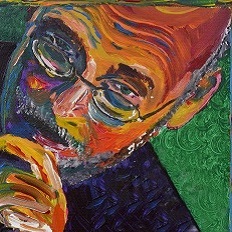Lucky doc
When you think you're lucky, is it just the post hoc ergo propter hoc fallacy?
Dr. Tai Key was one lucky guy. Everyone said so. When he covered an overnight shift, he seemed to always have a light night. When he was on service, he always managed to have the lowest census and a short length of stay. His O to E mortality was enviable. When The Joint Commission came to town for a survey, he was in Prague presenting at an international conference. His wife was a celebrity chef and his children were both in medical school. He drove a pristine yellow 1993 Porsche 964 Carrera that he had inherited from his aunt.

But Dr. Key didn't consider himself lucky at all. He felt like he had worked very hard and made many sacrifices. Yet he never seemed to get fascinating admissions when on call, and his inpatient service was uninspiring. He found it quite boring. Everyone else seemed to get more and more interesting cases. While some other hospitalist had an admission with calciphylaxis, he'd get his 10th patient of the week with alcohol withdrawal. There were no case reports coming from his team. When his colleagues were dealing with The Joint Commission, he was stuck in a hotel room on a dreary rainy day, missing his family, who really didn't seem to miss him. And that car—he hated driving stick and there was no trunk space. He felt like the only luck he had was bad.
Does luck exist? It's a funny thing. There's beginner's luck, lucky streaks, and the luck of the Irish. There's lucky numbers, potluck, and luck of the draw. Batters have lucky gloves and runners lucky sneakers. It's best not to push your luck, so cross your fingers and knock on wood. For every heads-up penny you find, there's a broken mirror. For every stroke of luck, there's a black cat huddled under a ladder on Friday the 13th. The Greek goddess Tyche could bring bad or good fortune. And if it was too good, Nemesis was waiting to stem the tide of happiness.
When you think you're lucky, is it just the post hoc ergo propter hoc fallacy? You rubbed your lucky totem and your wish came true, but did that charm cause the good luck? As physicians we know nothing can happen without a scientific paper to support it. One model of luck, termed chance, divides the concept into four levels, from the totally random occurrence to the well-prepared person making the best of an unexpected occurrence. Louis Pasteur said it best when he wrote (in French, of course) that chance favors the prepared mind. What does this mean? When Alexander Fleming looked at his bacterial lab plate and noticed a zone of nongrowth from the random arrival of Penicillium spores, he didn't throw it away. This was pure luck, but because he was prepared to recognize the significance, antibiotics were discovered.
On nights in the hospital when volumes are low, I often say it's great that we aren't busy. This is consistently met with horror by my colleagues. They tell me not to say that, that I'll jinx us and cause more admits. This is sympathetic magic and I don't support this belief system. I carry neither a rabbit's foot nor a four-leaf clover. Nothing is lucky to find itself in my pocket.
Last week I was sitting in the bowels of the hospital in “The Rock,” the Rochester Hospital Operational Command Center (see “Commandos,” June ACP Hospitalist). The census was looking great. Next to me were the other members of our all-star administrative team. We were marveling at how well hospital flow was going, how the census was quite manageable, how transfers were low and ED admissions were running below average. We took that to mean the new command center was working great! In reality, though, many of those factors could be unrelated to our recent opening and might just be luck.
I quipped that luck is a poor management approach, ranking with hope, prayer, and denial as basic administrative strategies. But then I thought about Pasteur and the prepared mind. Was it our preparation and our systemwide discussions about census that were driving down length of stay? Had we made people attuned to the concept of efficiency? Or was this really just plain dumb luck? There's a famous quote that's been attributed to a variety of luminaries over the years: “I'm a great believer in luck, and I find the harder I work, the more I have of it.”
So next time you are on call or in the boardroom or just trying to get to work on time, make sure you are rested and have a well-thought-out plan to cover all contingencies. You can then make an offering at a temple of Tyche, or just channel your inner Clint Eastwood: “You've got to ask yourself one question. ‘Do I feel lucky?’ Well, do ya, punk?”



